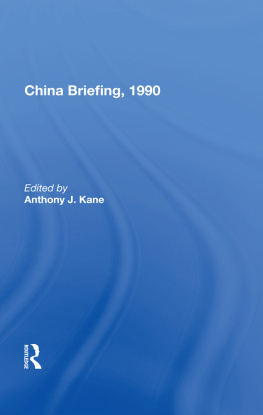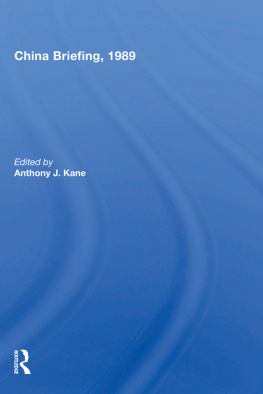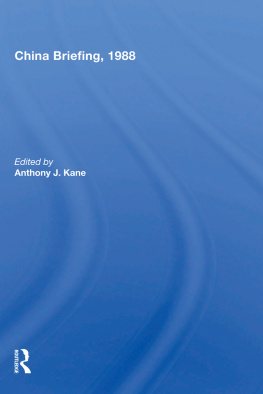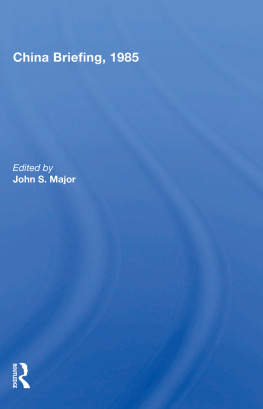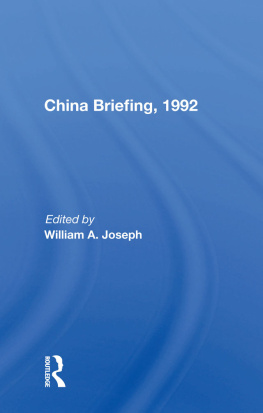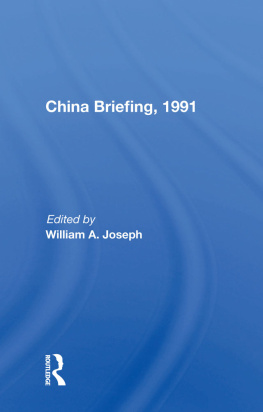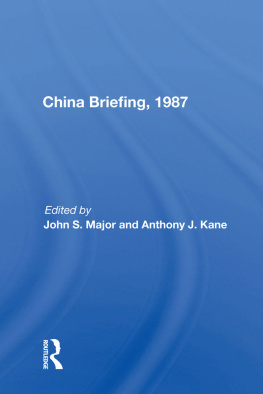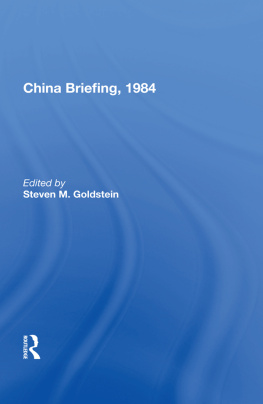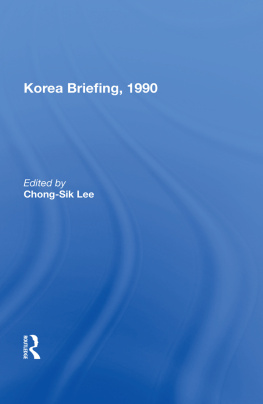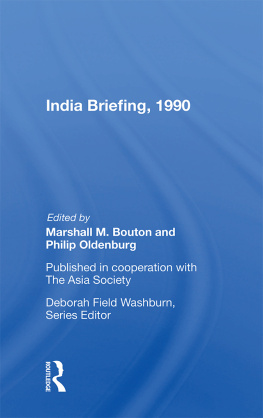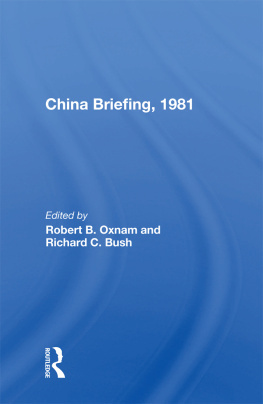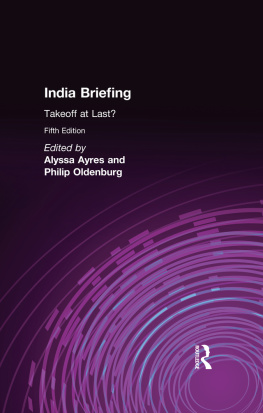First published 1990 by Westview Press
Published 2018 by Routledge
52 Vanderbilt Avenue, New York, NY 10017
2 Park Square, Milton Park, Abingdon, Oxon OX14 4RN
Routledge is an imprint of the Taylor & Francis Group, an informa business
Copyright 1990 by The Asia Society
All rights reserved. No part of this book may be reprinted or reproduced or utilised in any form or by any electronic, mechanical, or other means, now known or hereafter invented, including photocopying and recording, or in any information storage or retrieval system, without permission in writing from the publishers.
Notice:
Product or corporate names may be trademarks or registered trademarks, and are used only for identification and explanation without intent to infringe.
Library of Congress ISSN: 0740-8005
ISBN 0-8133-8011-1
ISBN 0-8133-8012-X (pbk.)
ISBN 13: 978-0-367-01561-9 (hbk)
Contents
ANTHONY J. KANE
KENNETH LIEBERTHAL
DWIGHT H. PERKINS
MARTIN KING WHYTE
ALLEN S. WHITING
LEO OU-FAN LEE
FRANK CHING
MELVYN C. GOLDSTEIN
Guide
When the tanks rolled into Tiananmen Square early in the morning of June 4, 1989, they crushed an unknown number of demonstrators and the once-vibrant student movement for which they stood. They also crushed the career of Chinese Communist Party General Secretary Zhao Ziyang and the hopes of innumerable reform-minded workers in public agencies and private think tanks whom Zhao had charged with restructuring Chinas political and economic system. More tragic still, they crushed the hopes of Chinese everywhere who believed in the leaderships commitment to replacing the rule of men with the rule of law. The excitement of events in Eastern Europe in the fall, which made all things seem possible, made the taste of Chinas increasingly repressive authoritarianism more bitter still.
There is an old saw in the China field: if you visit China for a week you can write a book; after a month you can write an article; and after a year you cannot write anything at all. The contributors to China Briefing, 1990 have spent many years studying China and have written many books, but 1989 was the kind of year that puts the most discerning analyst to the test. For many professional and amateur China watchers the crackdown that began June 4th crushed a growing hope that in the wake of the inexplicable madness of the Cultural Revolution, China was once again embarked on the kind of stable modernization process its leaders claimed to prefer. It is the task of this book to explain what went wrong and provide some understanding of what might come next.
China Briefing, 1990 continues the tradition of its predecessors by analyzing the key events and trends in Chinese affairs over the course of the previous year. However, many people will be chronicling and analyzing the dramatic events of 1989; a partial listing of those efforts already in print appears at the end of this volume. We have taken a somewhat different approach, asking the authors of our annual chapters on politics, economics, culture, and foreign relations to answer a broader question than simply what happened in 1989. We have asked each author to ponder how the events of the past year fit into the longer history of the Peoples Republic of China, which observed the 40th anniversary of its founding on October 1, 1989. Was 1989 a watershed year, whose events sharply reversed Chinas course, or will those events prove to have been relatively minor disruptions of longer-term trends? What broader systemic issues were raised or brought into sharper focus in the course of that less-than-celebratory anniversary year?
To help round out the picture, we have also addressed these questions in a chapter on society. And we have added special chapters on Hong Kong, which was dramatically affected by the years events, and Tibet, which continues to cause problems for Beijing both domestically and in its relations with the rest of the world.
China Briefing is prepared annually by the China Council, a program of The Asia Societys Education and Contemporary Affairs Division. The division also produces an annual India Briefing , and, for the first time this year, a Korea Briefing. The Asia Society is a nonprofit, non-partisan educational organization committed to increasing understanding of Asia and of U.S.-Asian relations through a nationwide program of cultural and informational events and publications.
The editor wishes to thank the staff of the Education and Contemporary Affairs Division who work so hard to bring this series to press on a very tight schedule: particularly Senior Editor Deborah Field Washburn and Publications Assistant Andrea Sokerka. Ellen Lenson prepared the chronology, the glossary, and the appendix, with help from Dorothy Grant. Salma Hasan Ali and Puneet Talwar provided excellent research assistance and editorial suggestions. Patricia Farr was extremely helpful in the final copyediting of the manuscript.
Anthony J. Kane
Source : U.S. Department of State, Background Notes: China, December 1983.
Anthony J. Kane
Tiananmen Square was created to witness history, and it has witnessed a lot. It spreads out before the Gate of Heavenly Peace, entrance to the ancient Forbidden City and the platform from which Mao Zedong proclaimed the founding of the Peoples Republic of China on October 1, 1949. In 1966 Chairman Mao used the square to rally millions of Red Guards and launch his Great Proletarian Cultural Revolution. And it was there nearly ten years later, on April 5, 1976, that demonstrators mourned the death of Premier Zhou Enlai and initiated a movement that brought the Cultural Revolution to an end.
For many years to come, however, Tiananmen will be associated with the tragic events of June 4, 1989, when six weeks of often joyous demonstrations for democracy came to a brutal and bloody end. Now it is not just millions of Chinese but hundreds of millions of people around the world who think of Tiananmen and mourn.
A year later, many of those who were there and many more who watched from afar are still struggling to understand how things could have gone so terribly wrong. The painful scars left by the chaos and madness of the Cultural Revolution were thought to be healing after a decade of reform, reform that was supposed to bring peace and prosperity back to China and to the world around it. Now many of the old wounds have opened once again, and no one seems to know how to stop the bleeding.
It is difficult to remember what the world was like when 1989 began. China was undergoing a difficult economic retrenchment program following a serious bout with inflation and other problems produced by an overheated economy. Nevertheless, the spirit of reform was pervasive in free markets and tiny independent enterprises around the nation. Soviet leader Mikhail Gorbachev was scheduled to make a pilgrimage to Beijing, hat in hand it seemed at the time, after giving in on all of the three obstacles (as defined by the Chinese) to improved Sino-Soviet relations: troops on the Sino-Soviet border, the Soviet presence in Afghanistan, and Soviet support for the Vietnamese in Cambodia. U.S. President George Bush rushed to get to Beijing first, and when the Chinese blocked dissident astrophysicist Fang Lizhi from attending an American-hosted banquet the president refused to let it upset his relationship with his good friend Deng Xiaoping.


